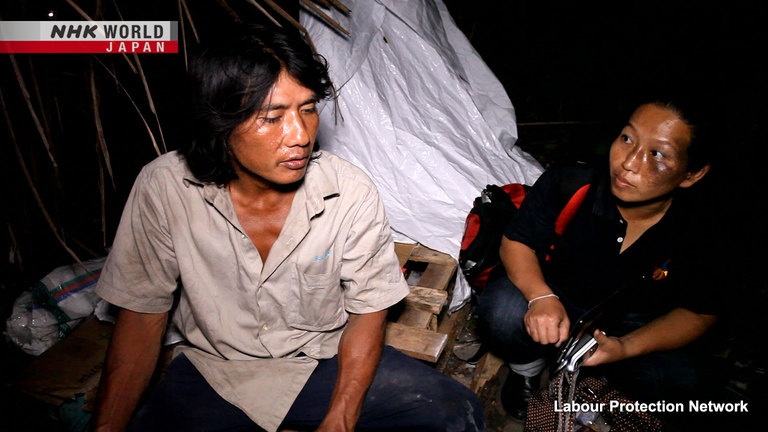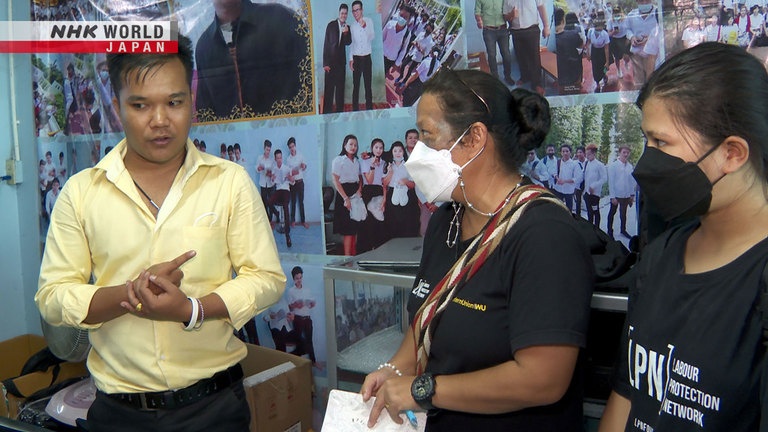Saving the "Sea Slaves": Patima Tungpuchayakul / Co-founder, Labour Protection Network
Thai activist Patima Tungpuchayakul is co-founder of the NGO called Labour Protection Network. She has been saving workers victimized by the giant fishing industry that is exporting seafood worldwide.


Transcript
Direct Talk
Thailand has one of the biggest
fishery industries in the world.
The massive volume of seafood exports
brings in more than
5 billion US dollars annually.
But besides migrants
from neighboring countries,
the industry workers include many poor Thais.
The issue of forced labor
on the fishing boats,
or "sea slaves,"
has also been problematic.
Patima Tungpuchayakul
Co-founder, Labour Protection Network
Thai activist Patima Tungpuchayakul
has been working to save people
victimized by the fishing industry.
Labour Protection Network video
No one deserves to die
because of our seafood,
not even a single life.
We need to continue keeping a close watch
on the quality of life of the workers.
How can illegal fishing practices be
eradicated and workers' rights protected?
We will hear from the woman
who has continued to fight for them.
Saving the "Sea Slaves"
I don't usually use the term "hell,"
but I felt that is what it's like.
Once I saw the reality
of the fishery industry,
I thought this whole system must stop.
In recent years, the Thai seafood industry
has become well known
and it now ranks up among
the top countries in the world.
The fish are clean and of good quality.
However, what if the fishing itself,
the way the fish are processed, is illegal,
and those working in the fishery industry
have not been receiving proper wages?
Mahachai
The port town of Mahachai
is located about 40 kilometers
southwest of the Thai capital Bangkok.
As one of the biggest fishery hubs in Asia,
it attracts many poor people
and migrants to come for work.
Patima's NGO, "Labour Protection Network,"
or LPN, is based in the town.
It has been helping workers
for the last 18 years.
Any information on the child labor?
I heard there are children forced to work.
In this area,
fatal incidents on boats
are a daily occurrence.
Other issues include
long working hours and unpaid wages.
Ever since we founded this NGO in 2004,
I've been shocked by the practices
of the seafood-related industry in this area.
One example that I saw was when
I observed the shrimp processing factory.
Work such as the peeling process was
being conducted with very cheap labor,
forced labor,
and even with child labor.
That was happening very often.
I also discovered that many sea workers,
who work on fishing boats and catching fish,
were not receiving their proper wages at all.
That is a very common situation.
Here is the core problem...
It all starts when we regard
those workers just as "unskilled labor."
In Thailand, I think we look down on them,
and therefore we treat them very unequally.
To reduce costs,
we just keep underpaying those workers.
Patima was born in 1975
in the suburbs of Bangkok.
Her father worked as a bus driver,
and her mother was a factory worker.
The fact that their life was not wealthy
fueled her feelings of anger
about the inequalities of society.
At the age of 22,
Patima reached a turning point.
Patima
She was diagnosed as suffering from cancer
and decided she should work
for the vulnerable
for the rest of time she was given to live.
In 2004, Patima established the
Labour Protection Network
with her husband Sompong Srakaew,
focusing on providing protection
for the most vulnerable migrant children
who have always been trapped.
Even today, Patima is
providing a "safe house"
for about 10 kids abandoned
by their parents or sexually abused.
Aside from being an activist,
she has another face as the "mother"
who takes care of them.
I think Patima's work dedicating herself
to helping disadvantaged people is great.
I am also one of the kids
who was saved by her.
Maybe it was good for me
to have cancer at that time,
because it gave me the chance
to reset my whole life,
and start thinking about
how the rest of my life should be.
I noticed that by helping other people
I made myself suffer less.
So it became my mission to help others.
At that time, I started to realize
that justice can only be realized
when we start seeking for it
by proper actions.
Then I also understood that,
despite my disease,
I still had opportunities -
I still had a healthy body,
and I could study in a proper way.
I had opportunities.
So, I thought I should work
for the vulnerable
and help those who don't
have such opportunities.
For the last ten years,
Patima has been working extensively
on the issue of "sea slaves."
She has investigated many cases
of the human trafficking
that is used to provide a workforce
for the fishing boats,
and the reality of forced labor in the industry.
These are the letters from the victims,
or "sea slaves,"
addressed to the Thai Prime Minister.
The letters asking for immediate help
were handed to Patima by victims
who had been left behind
on remote islands for years.
We were cheated by the broker.
Please help all Thais to return home.
Those victims of becoming "sea slaves"
are often very poor and vulnerable.
Sometimes they're homeless people
or have no family.
Patima Tungpuchayakul
Co-founder, Labour Protection Network
There are also orphans
who have no choice on land.
They're often tricked onto
fishing boats by traffickers,
and once they're on board,
their identity cards and documents
are thrown away.
On the fishing boats, they have to
keep working for very long hours.
If they don't wake up,
the captain will keep ringing a buzzer.
If the workers don't get up,
boiling water is poured on them
to wake them up.
If their work is slow,
a steel pipe is used to hit the workers.
And those who work super slow
or start fighting
or cause some issue on the boat
may be shot with a gun.
Once they're in that situation,
they're called "ghost people"
which means those who have died.
They are never allowed to return.
Yodchai Pholchan, who used to
help Patima and her NGO,
was one of those
marine "ghosts" who survived.
Yodchai Pholchan
Former victim
This is a photo of him taken when he was
rescued from a remote island in Indonesia.
Since the age of 12,
he had been forced to work on fishing boats,
and was then left behind in a sea area
far from his native Thailand.
I was not given any time to rest or
even sleep when the work was not finished.
I had very bad, unbelievable experiences
on the fishing boats.
After one year,
Yodchai could bear it no longer.
He dived into the sea to escape,
and hid on a remote island that he reached.
There are three ways to learn
where the slaves are:
first, we receive information
from the worker's family and
relatives and requests for help;
second, we often receive news
from other survivors of slavery;
and third, sea slaves left in Indonesia
find our phone number
and give us a call for help directly.
2015
Labour Protection Network video
Based on information and clues,
Patima searches for victims in areas
such as the eastern islands of Indonesia.
2015
Labour Protection Network video
On this field investigation,
during just one week of research,
her team found about 250 victims,
including Thais and Burmese.
- How long have you been here?
- It's about a year.
- Do you want to go back to Thailand?
- Yes.
Let's go home.
Patima found Yodchai
during another field investigation.
It had been nine years
since he escaped from a fishing boat.
If we miss this chance,
we won't be able to go back.
Let's go back to Thailand,
to see your family.
You can restore your ID,
and let's get the unpaid wages.
With the help of Patima,
Yodchai could finally go back to Thailand.
Finding those victims was not so difficult.
We kept asking the local people
for the whereabouts of "Thais,"
and there were actually
many of them in the area.
Some workers spent
a very long time on a boat.
One went on board when he was 13
and was rescued when he was 30.
Another guy was forced to work for 30 years.
These terrible practices have been going on
for a long time in the fishery industry.
On another island,
Patima faced a more shocking reality.
This is a mass grave
where more than 100 workers are buried.
It was shocking
that so many people were left
and died in a place far from their homeland.
When I saw that graveyard,
I thought this kind of business must end.
I know this matter is very big,
but I determined that I must act to fix it.
I talked to the graves, to the dead people,
asking them to help me and protect me,
and then the rest of the sea workers as well.
And I told those who died that, if possible,
I would try to bring their bones back home
for their relatives to perform
a proper religious ceremony.
Patima and her team contact
the Thai government authority
and relevant immigration offices,
and have helped thousands of workers go home.
Due to these activities,
criticism against illegal fishing
has been mounting.
The European Union even threatened
to conduct a trade ban on Thai seafood.
The Thai government
has tightened regulations,
but Patima remains cautious,
suspecting that the fishery companies
will be using many legal loopholes
to continue similar bad practices.
Right now, the vessels are still,
but in a few moments,
they will head out to the ocean.
Patima Tungpuchayakul
Co-founder, Labour Protection Network
Every time we do a survey,
we check the numbers of all the vessels.
Thailand has exposed criminals
and bad operators on the ocean.
So, to keep getting
the highest profit possible
from their socially irresponsible business,
they have had to move to
other waters out of Thai territory.
I think those illegal fishing
practices are still going on.
Their system for covering up
may be more complex,
like changing the boat's nationality
or changing vessel flags for camouflage.
It's harder now to reveal
the illegal practices.
SOS messages from
stranded workers are reaching Patima
even with the travel restrictions
during the Covid pandemic.
Can you rescue and take us home?
This message was sent by workers
stranded in Malaysia for the last six years.
Can you rescue and take us home?
Actually, there are some former victims
that Patima has rescued before.
After returning home,
some of them have to face harsh reality,
such as having nobody to take care of them,
or financial struggles.
Then they have no choice
but to go back to work on fishing boats.
They often think,
"This is not the first time
and I know the work better,
and I will get paid this time."
By hoping that, they go back to the boats.
But as a result, they get abused
and become slaves again.
But there is nowhere else for them to go.
They have no options.
I can't help worrying about
the quality of workers' lives on many seas.
Are they really treated as humans?
What is the motto of Patima
who has fought for the
vulnerable for many years?
Nothing is impossible in the world
unless we don't do it.
I value actions.
Nothing will ever change
unless we take actions.
Just do it!
And it's been proved
you can save even thousands of lives!
if you don't stop doing it,
I believe it will eventually work out well.